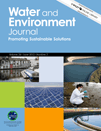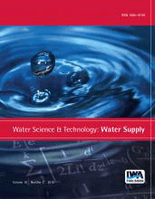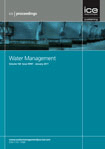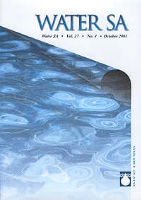
Water
Scope & Guideline
Championing high-quality research for a water-secure world.
Introduction
Aims and Scopes
- Water Quality Assessment and Management:
Research on assessing and managing the quality of water resources, including the identification of pollutants, the analysis of their sources, and the evaluation of treatment technologies. - Hydrological Modeling and Simulation:
Studies involving the modeling of hydrological processes, including rainfall-runoff relationships, water balance, and flood forecasting, to better understand and manage water resources. - Ecological Impact and Restoration:
Investigations into the ecological impacts of water management practices and the development of restoration strategies for aquatic ecosystems affected by human activities. - Water Treatment Technologies:
Exploration of advanced technologies for water treatment, including chemical, biological, and physical methods aimed at improving water quality and resource recovery. - Water Resource Management:
Research on sustainable management practices for water resources, including the impacts of climate change, land use changes, and urbanization on water availability and quality. - Microbial and Chemical Interactions in Water Systems:
Studies focusing on microbial dynamics in aquatic environments, pollutant degradation mechanisms, and the interactions between chemical substances and biological systems.
Trending and Emerging
- Machine Learning in Water Management:
An increasing number of studies are employing machine learning techniques for water quality prediction, hydrological modeling, and resource management, showcasing the integration of data science in water research. - Nature-Based Solutions for Water Management:
There is a growing emphasis on nature-based solutions, such as green infrastructure and constructed wetlands, as effective strategies for managing water resources and mitigating environmental impacts. - Microplastics in Aquatic Environments:
Research on microplastics has surged, focusing on their sources, distribution, and ecological impacts, reflecting heightened awareness of this pervasive issue in water bodies. - Climate Change Impacts on Water Resources:
An emerging trend involves assessing the impacts of climate change on hydrological cycles, water availability, and quality, emphasizing the need for adaptive management strategies. - Integrated Water-Energy-Food Nexus:
Studies exploring the interconnections between water, energy, and food systems are gaining prominence, reflecting a holistic approach to resource management amidst increasing global pressures. - Advanced Water Treatment Technologies:
Research into advanced oxidation processes, biochar applications, and hybrid treatment systems is on the rise, demonstrating innovation in addressing emerging contaminants and improving water quality.
Declining or Waning
- Traditional Water Quality Indices:
There has been a noticeable reduction in studies solely relying on traditional water quality indices, as researchers now favor more comprehensive and data-driven approaches that consider multiple parameters simultaneously. - Conventional Wastewater Treatment Methods:
The focus on conventional wastewater treatment methodologies has diminished in favor of innovative and sustainable technologies such as constructed wetlands and advanced oxidation processes. - Static Hydrological Models:
Research utilizing static models for hydrological forecasting has decreased, with a shift towards dynamic and integrated modeling approaches that account for changing environmental conditions. - Single-Factor Pollution Studies:
The trend of studying single pollutants in isolation is declining, as there is an increasing recognition of the complex interactions between multiple contaminants and their collective effects on water quality. - Local Case Studies without Broader Implications:
There is a waning interest in isolated case studies that do not connect to broader environmental or management implications, as interdisciplinary and integrated approaches gain more traction.
Similar Journals

H2Open Journal
Championing open research for a thriving aquatic ecosystem.H2Open Journal, published by IWA Publishing, is a leading open-access platform established in 2018, dedicated to advancing the field of water science and technology. With its E-ISSN 2616-6518, this journal caters to a global audience, providing essential research insights that span various domains, including environmental science, management, monitoring, policy, law, and water science. The journal has achieved notable recognition in recent years, holding a Q3 ranking in three distinct categories within the 2023 environmental science metrics. Its commitment to open access ensures that valuable research is freely available to researchers, professionals, and students alike, fostering collaboration and innovation in water-related disciplines. With a focused publication strategy spanning from 2018 to 2024, H2Open Journal is poised to be a pivotal resource for addressing critical challenges in water sustainability and management, reflecting the pressing need for informed actions in the face of global water issues.

Water Practice and Technology
Connecting Research and Practice in Water TechnologyWater Practice and Technology is a distinguished open-access journal published by IWA PUBLISHING, dedicated to disseminating cutting-edge research and practical insights within the field of water science and technology. With an E-ISSN of 1751-231X, the journal has been at the forefront of sharing knowledge since its inception in 2011 and has transitioned to open access in 2021, providing unrestricted access to high-quality research articles. Based in the United Kingdom, this journal plays a vital role in advancing the understanding of water resource management, treatment technologies, and environmental sustainability. As of 2023, it is categorized in the Q3 quartile for Water Science and Technology with a Scopus rank of #157/261, placing it in the 40th percentile among its peers. Researchers, professionals, and students alike will find the journal a valuable resource for the latest trends, innovations, and practical applications in the water sector, facilitating a collaborative approach towards addressing global water challenges.

Journal of Applied Water Engineering and Research
Transforming Research into Real-World Water SolutionsJournal of Applied Water Engineering and Research is a dynamic platform dedicated to the advancement of knowledge in the field of water science and technology. Published by Taylor & Francis Ltd, this journal aims to bridge the gap between theoretical research and practical applications in water engineering, providing a crucial resource for researchers, practitioners, and policymakers. With an ISSN of 2324-9676 and an impressive ranking in the Q3 category for Water Science and Technology, it occupies a distinctive position within the scholarly community. The journal covers a wide spectrum of topics, including innovative water management strategies, sustainable practices, and the integration of technology in water resource management, thus contributing significantly to the discourse surrounding environmental sustainability. With publication years converging from 2013 to 2024, the Journal of Applied Water Engineering and Research continues to foster impactful research, enhancing our understanding and management of vital water resources.

ACS ES&T Water
Transforming research into actionable water solutions.ACS ES&T Water, published by the American Chemical Society, is a leading peer-reviewed journal focused on the interdisciplinary field of water science and technology. Since its inception in 2021, the journal has rapidly established itself as a prominent platform for research, boasting an impressive impact factor and ranking in the Q1 category across various disciplines, including Chemical Engineering, Chemistry, Environmental Chemistry, and Water Science and Technology. With a current Scopus rank of #66 out of 261 in Environmental Science and a remarkable percentile of 74%, ACS ES&T Water is dedicated to advancing the understanding of water-related challenges and solutions through high-quality research. The journal aims to facilitate communication among researchers, professionals, and policymakers by providing open access to innovative studies and methodologies that address critical issues in water resource management and sustainability. Collaborating at the intersection of chemistry and environmental science, this journal is essential for anyone invested in the future of global water security and innovation.

JOURNAL OF HYDROMETEOROLOGY
Innovating Insights into Climate and HydrologyJOURNAL OF HYDROMETEOROLOGY, published by the American Meteorological Society, is a leading scholarly journal that serves as a vital resource within the field of atmospheric science. With its ISSN 1525-755X and E-ISSN 1525-7541, this journal provides a platform for the dissemination of high-impact research, currently holding a prestigious Q1 ranking in Atmospheric Science as per the 2023 Category Quartiles. It enjoys an excellent reputation, ranked #30 out of 148 in the Scopus listings, placing it in the top 80th percentile within Earth and Planetary Sciences. Publishing rigorous and innovative studies from 2000 to 2024 and beyond, the journal addresses critical topics including weather forecasting, climate dynamics, and hydrological processes, making it essential reading for researchers, professionals, and students alike. Though not an open-access journal, it continues to enrich the academic community with quality contributions dedicated to advancing our understanding of hydrometeorological phenomena.

WATER RESOURCES MANAGEMENT
Transforming Challenges into Opportunities in Water ManagementWATER RESOURCES MANAGEMENT is a prestigious journal published by SPRINGER, renowned for its contribution to the fields of Civil and Structural Engineering as well as Water Science and Technology. Operating since 1987, this journal has established itself as a vital resource for researchers, professionals, and students alike, boasting a remarkable impact factor and a Q1 designation in both relevant categories as of 2023. The journal is indexed in Scopus, achieving commendable ranks—34th in Environmental Science and 62nd in Civil and Structural Engineering, placing it in the top percentiles of its fields. Although it does not offer open access, WATER RESOURCES MANAGEMENT serves as a comprehensive platform for disseminating innovative research, discussions, and case studies that address the global challenges of water resource management. With a commitment to fostering knowledge and advancing the understanding of integrated water management solutions, this journal is indispensable for anyone engaged in these critical scientific domains.

WATER AND ENVIRONMENT JOURNAL
Championing open access to vital environmental research.WATER AND ENVIRONMENT JOURNAL is a prominent interdisciplinary journal dedicated to the latest research and advancements in the fields of water resources, environmental engineering, and pollution management. Published by WILEY, the journal has established itself as an essential resource for academics, practitioners, and policymakers since its inception in 1987. With an impressive impact factor reflecting its robust influence, it ranks in the Q2 and Q3 quartiles across multiple categories, including Water Science and Technology, Environmental Engineering, and Management, Monitoring, Policy and Law. The journal welcomes high-quality research articles, reviews, and case studies that address the critical challenges facing water and environmental sciences. As an open access publication, it provides a platform for widespread accessibility and engagement, ensuring that the knowledge generated is disseminated to a diverse audience. With a commitment to advancing understanding and solutions in water-related issues, WATER AND ENVIRONMENT JOURNAL plays a crucial role in shaping the future of environmental research and technology.

Water Supply
Exploring innovations in water science.Water Supply is an esteemed journal published by IWA PUBLISHING that plays a pivotal role in the field of water science and technology. With an ISSN of 1606-9749 and an E-ISSN of 1607-0798, this journal has been a key resource for researchers and professionals since its inception in 2001. Now covering a wide range of topics until 2024, it is recognized for its impactful contributions, holding a Q2 ranking in the Environmental Science: Water Science and Technology category, and currently stands at rank #125 out of 261 in Scopus, reflecting its relevance and influence in the academic community. The journal aims to disseminate significant research findings and innovations in water supply management, ensuring that professionals and students are equipped with the latest knowledge and practices in the sector. Despite not being an open-access journal, Water Supply continues to attract high-quality submissions that enhance our understanding and preservation of vital water resources. For those invested in sustainable water practices, this journal is an invaluable tool for continued learning and advancement.

PROCEEDINGS OF THE INSTITUTION OF CIVIL ENGINEERS-WATER MANAGEMENT
Advancing Sustainable Solutions in Water ManagementPROCEEDINGS OF THE INSTITUTION OF CIVIL ENGINEERS-WATER MANAGEMENT is a prestigious journal published by Emerald Group Publishing Ltd, dedicated to advancing the field of water management within civil engineering. With an ISSN of 1741-7589 and an E-ISSN of 1751-7729, this journal delivers peer-reviewed research that spans the critical intersections of water science and technology, contributing valuable insights into sustainable water management practices. As evidenced by its ranking in the 2023 Scopus categories, where it holds the Q3 quartile in Water Science and Technology, and a respectable position among its peers, the journal remains a vital resource for researchers, professionals, and students in the field. Though it is not an open-access journal, it offers accessible subscription options that facilitate worldwide dissemination of knowledge, enhancing its role as a fundamental reference point for cutting-edge developments in water management. For those looking to publish or stay updated on the latest research trends, this journal serves as an essential platform for promoting innovation and sustainable practices in civil engineering and water resources management.

WATER SA
Fostering interdisciplinary dialogue for water solutions.WATER SA, published by the WATER RESEARCH COMMISSION, serves as a pivotal platform for interdisciplinary research in the areas of water science and technology. With an ISSN of 0378-4738 and an E-ISSN of 1816-7950, this open-access journal has been committed to disseminating knowledge since 2005, ensuring that research is freely accessible to a global audience. As of 2023, it holds a Q3 ranking in several key categories including Applied Microbiology and Biotechnology, Management, Monitoring, Policy and Law, Waste Management and Disposal, and Water Science and Technology. These rankings reflect its significant contribution to these disciplines, particularly in South Africa where it is based. With a history dating back to 1976 and converging research efforts extending through 2024, WATER SA aims to illuminate pressing water-related challenges and foster innovative solutions through rigorous scientific inquiry. Researchers, professionals, and students interested in the sustainability and management of water resources will find its comprehensive portfolio essential for advancing their work and understanding in an increasingly critical field.